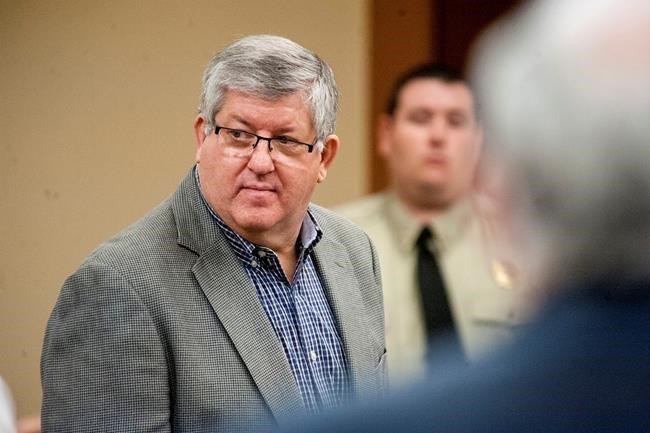
FILE - Bernie Tiede, left, stands in court during day nine of his new sentencing trial, April 18, 2016, at the Rusk County Justice Center in Henderson, Texas. Tiede, the former mortician serving a life sentence for killing widow Marjorie Nugent in 1996, sued the Texas prison system for stiflingly hot conditions he said endangered his life. (Michael Cavazos/The News-Journal via AP, Pool, File)
Republished July 30, 2024 - 2:36 PM
Original Publication Date July 30, 2024 - 12:31 PM
AUSTIN, Texas (AP) — Describing Texas prisons as so hot that inmates would cool off by splashing themselves with toilet water or faking suicide attempts to get moved to cooler medical areas, advocates on Tuesday asked a federal judge to declare the state prison system's lack of air conditioning as unconstitutional cruel and unusual punishment.
Tuesday began a multi-day hearing in a lawsuit that seeks to force Texas to fully air condition a prison system that houses more than 130,000 inmates, but has full AC in only about a third of its 100 prison units. The rest have partial or no air-conditioning.
Inmate advocacy groups allege that temperatures inside can push above 120 degrees Fahrenheit (48.9 Celsius), and that the extreme heat has led to hundreds of inmate deaths in recent years. They want U.S. District Court Judge Robert Pitman to require Texas to maintain temperatures in prison housing and occupied areas between 65 and 85 degrees F (18 and 29 degrees Celsius), the same temperature range required by law in county jails.
Texas is not alone in facing lawsuits over dangerously hot prisons. Cases also have been filed in Louisiana and New Mexico. One filed last week in Georgia alleged an inmate died in July 2023 after he was left in an outdoor cell for hours without water, shade or ice.
The Texas lawsuit was initially filed in 2023 by Bernie Tiede, the former mortician whose murder case inspired the movie “Bernie.” Tiede, who is serving a life sentence for killing Marjorie Nugent, a wealthy widow in 1996, has diabetes and hypertension and alleged his life was in danger because he was being housed in a stifling prison cell without air conditioning.
At Tuesday's hearing, Marci Marie Simmons, who moved between three Texas prisons while serving 10 years for felony theft, described “oppressive, suffocating” conditions as temperatures rose from spring through summer. She was released in 2021.
“In summer, I was in complete survival mode. I felt like a caged animal,” said Simmons, who is now the community outreach coordinator for Lioness: Justice Impacted Women’s Alliance, a plaintiff in the lawsuit. She said the organization represents about 700 current and former inmates.
Simmons testified she once watched a kitchen worker bring an egg back to her cell and cook it on the concrete floor. In 2020, a hallway thermometer in one unit reached 136 degrees when Simmons and two other inmates peeled off the tape that was meant to hide the reading, she said.
“I was shocked. It frightened me,” Simmons said.
Assistant State Attorney General Marlayne Ellis said the state would like to provide more air conditioning but is constrained by the Legislature's budget.
And she insisted conditions in Texas prisons do not meet a standard for being cruel and unusual. The agency defended its alternative protocols for extreme heat, which include providing fans, towels and access to cooler “respite” areas. In 2018, Texas agreed to install air conditioning at a prison for older and medically vulnerable inmates.
But Simmons said access to respite areas was limited to short periods of time, coolers of ice water didn't hold enough to serve an entire prison dorm, and up to 100 women would wait to use a single shower head that was changed from hot to cold water.
Desperate women would fake suicide attempts, or “commit some harm” to themselves to get placed in a cooler medical unit, Simmons said.
A November 2022 study by researchers at Brown, Boston and Harvard universities found that 13%, or 271, of the deaths in Texas prisons without universal air conditioning between 2001 and 2019 may be attributed to extreme heat. Prisoner advocates say those numbers are only likely to increase as the state faces more extreme weather and heat due to climate change.
According to a report by KUT Radio in Austin, autopsy reports on at least three inmates deaths in 2023 mentioned heat a possible contributing factor. The Texas Department of Criminal Justice, however, has said there have been no heat-related deaths in the state’s prisons since 2012.
Tiede attended Tuesday's court hearing. Since filing his lawsuit, he has been moved to an air conditioned cell. But several prisoners’ rights group asked to join his legal fight and expand it to encompass all Texas prisoners.
Charlie Malouff, vice president of the advocacy group Citizens United for the Rehabilitation of Errants, spent more than three years in Texas prisons from 2015-2018. He said in one unit, inmates would set fires just so guards would spray their cell block with hoses. In another unit, he said he saw thermometers routinely approach 115 degrees (46 degrees Celsius) or higher.
“It was horrible. It sucks the oxygen right out of you,” Malouff said.
News from © The Associated Press, 2024